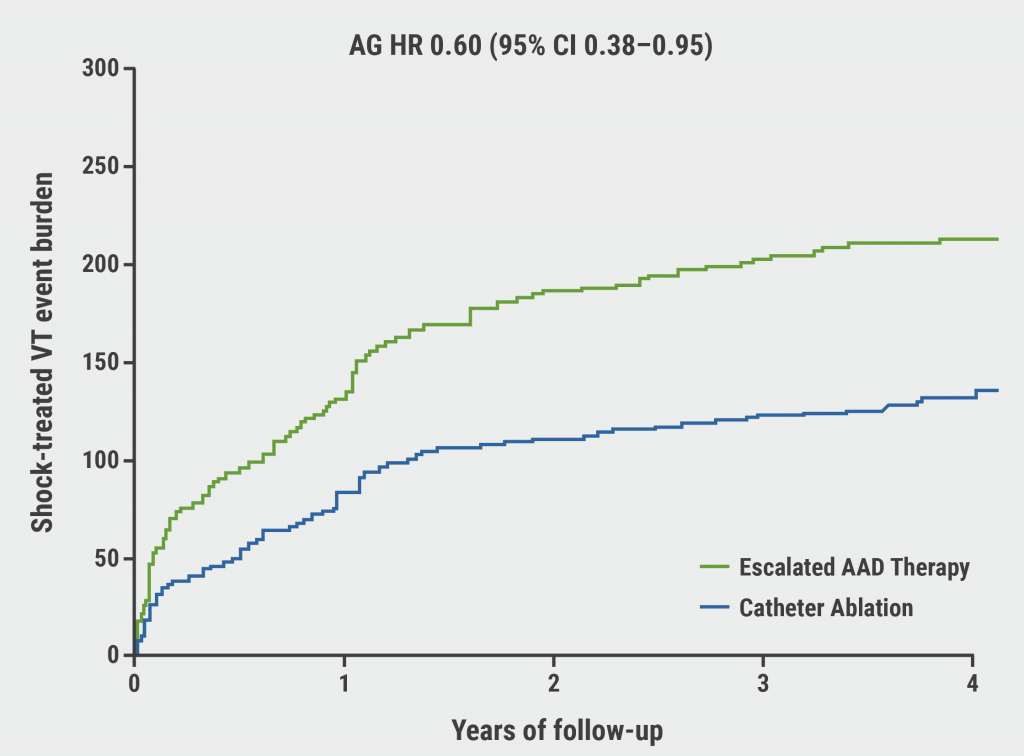https://doi.org/10.55788/f48e0a62
E-health is increasingly applied in heart rhythm control strategies and in screening for comorbidities such as SA. In addition, SA is difficult to diagnose in patients with AF but may contribute to AF progression. Dr Dominique Verhaert (Maastricht University Medical Center, Netherlands) and colleagues aimed to assess a structured remote polygraphy screening tool for SA in patients who were scheduled for AF ablation [1]. In total, 733 patients with paroxysmal or persistent AF were randomised to an at-home sleep test to screen for SA (n=425) or standard-of-care (n=308). In the control group, 8% of the participants had been previously diagnosed with SA while SA status was unknown in the remaining 92%. In the intervention group, 12% of the participants had been previously diagnosed with SA.
The screening intervention identified 184 new cases of SA (43%). Following the apnea-hypopnea Index (AHI), these new diagnoses included mild (16%), moderate (19%), and severe cases (8%) of SA. Furthermore, SA had been ruled out in 9% of the participants and the results were still pending at the time of the analysis for 22% of the participants. Therefore, the number of newly identified cases of SA may be even higher than the current analysis suggests. In 13% of the participants in the intervention group, SA status was still unknown because these participants preferred not to be screened (see Figure).
Figure: The impact of screening on diagnosed apnoea [1]

“This study showed that SA is highly prevalent in patients with AF who are set for catheter ablation. The knowledge of SA status is important because it provides the opportunity to initiate targeted treatments, such as continuous positive airway pressure (CPAP) therapy. The follow-up study will reveal whether these results will have an impact on AF ablation outcomes.”
- Verhaert DVM, et al. The impact of a structured polygraphy screening incorporated in a novel remote mobile health pathway on sleep apnoea prevalence in patients with atrial fibrillation. E-Cardiology award session, EHRA 2022, 3–5 April, Copenhagen, Denmark.
Copyright ©2022 Medicom Medical Publishers
Posted on
Previous Article
« AI model accurately discriminates between arrhythmias Next Article
Developments in imaging tools for AF »
« AI model accurately discriminates between arrhythmias Next Article
Developments in imaging tools for AF »
Table of Contents: EHRA 2022
Featured articles
Letter from the Editor
Diagnostics and Prevention
Cardiac magnetic resonance imaging improves prediction of post-MI sudden cardiac death
AI model accurately predicts sudden cardiac death in overall population
AI model accurately discriminates between arrhythmias
Impact of AF screening on stroke prevention influenced by systolic blood pressure
Developments in Devices
Conduction system pacing potential alternative for biventricular pacing in heart failure
Left bundle branch area pacing is a feasible technique for HF and bradyarrhythmia
Focus on the efficacy of cardiac resynchronisation therapy in HF plus concomitant AF
RESET: No survival benefit of CRT-defibrillator over CRT-pacemaker in heart failure
Insertable cardiac monitors effective for AF detection in cryptogenic stroke
Updates on Ablation
First results of the POWER FAST III trial
Real-world safety results on pulsed-field ablation with pentaspline catheter
VANISH: Ablation reduces shock burden compared with anti-arrhythmic drug in ventricular tachycardia
Low AF recurrence rates after PVI using pulsed-field ablation
Pulsed-field ablation reduces neurocardiac damage versus cryoballoon ablation
Ultrasound-guided femoral venipuncture reduces complications in catheter ablation
News on Atrial Fibrillation
Sex differences revealed in AF determinants and AF progression
Early rhythm-control therapy efficacious in men and women with AF
Progression in remote app-based monitoring of atrial fibrillation
Other Topics
Benefits of SGLT2 inhibitors may extend beyond HF-associated outcomes
© 2024 Medicom Medical Publishers. All rights reserved. Terms and Conditions | Privacy Policy


